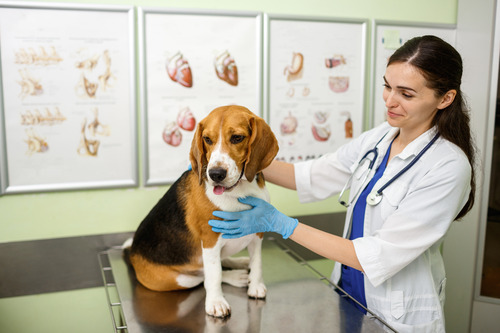Stress colitis in dogs can be a distressing condition for both pets and their owners. If your dog has been diagnosed with stress colitis, you might be wondering what steps to take next. This blog will provide you with an understanding of stress colitis in dogs and how to manage it effectively. Please note that while this article is informative, it is not a substitute for professional veterinary advice. For personalized guidance, contact Best Friends Animal Hospital in Manchester, NH, at (603) 625-2378.
Understanding Stress Colitis in Dogs
Stress colitis in dogs occurs when the large intestine becomes inflamed due to stress. This inflammation can lead to various symptoms, including diarrhea, abdominal pain, and frequent bowel movements. Understanding the causes and symptoms of stress colitis is crucial for managing this condition.
Causes of Stress Colitis in Dogs
Stress colitis in dogs is often triggered by factors that induce stress. Changes in the environment, such as moving to a new home, can be significant stressors. Other common causes include loud noises, new pets or family members, and separation anxiety. Identifying the source of your dog’s stress can help you manage their condition more effectively.
Symptoms of Stress Colitis in Dogs
Recognizing the symptoms of stress colitis is essential for early intervention. Common signs include:
- Diarrhea, often with mucus or blood
- Frequent and urgent need to defecate
- Straining during bowel movements
- Abdominal pain and discomfort
- Loss of appetite
- Lethargy
If your dog exhibits any of these symptoms, it’s important to consult with your veterinarian promptly.
Diagnosis and Veterinary Care
Diagnosing stress colitis in dogs typically involves a combination of physical examination, medical history, and diagnostic tests. Your veterinarian will rule out other potential causes of colitis, such as infections or dietary issues.
Diagnostic Tests
To confirm a diagnosis of stress colitis, your veterinarian may perform several tests, including:
- Fecal examination to check for parasites
- Blood tests to rule out systemic conditions
- Abdominal ultrasound to assess the intestines
- Endoscopy or colonoscopy for a detailed view of the colon
These tests help ensure that your dog’s symptoms are due to stress colitis and not another underlying condition.
Managing Stress Colitis in Dogs
Managing stress colitis in dogs involves addressing both the symptoms and the underlying causes of stress. Here are several strategies to help your dog feel better and prevent future episodes.
Dietary Management
Diet plays a significant role in managing stress colitis in dogs. Your veterinarian may recommend a special diet that is easy on your dog’s digestive system. High-fiber diets can help firm up stools and reduce inflammation. Additionally, feeding smaller, more frequent meals can aid digestion and reduce gastrointestinal stress.
Stress Reduction Techniques
Reducing your dog’s stress levels is crucial for managing stress colitis. Here are some effective techniques:
- Routine and Consistency: Maintaining a consistent daily routine can help reduce stress for your dog.
- Safe Spaces: Providing a safe, quiet space where your dog can retreat during stressful situations can be very beneficial.
- Positive Reinforcement: Using positive reinforcement techniques to manage anxiety and promote calm behavior.
- Exercise: Regular exercise can help reduce stress and improve overall well-being.
Veterinary Treatment Options
In some cases, veterinary treatment may be necessary to manage stress colitis in dogs effectively. Your veterinarian may prescribe medications to alleviate symptoms and address the underlying causes of stress.
Medications
Medications can help manage the symptoms of stress colitis in dogs. Commonly prescribed medications include:
- Anti-diarrheal medications to reduce diarrhea and firm up stools.
- Probiotics to restore healthy gut flora and improve digestion.
- Anti-inflammatory drugs to reduce inflammation in the colon.
- Anxiety medications to address underlying stress and anxiety.
Probiotics and Supplements
Probiotics and supplements can be beneficial for dogs with stress colitis. Probiotics help maintain a healthy balance of gut bacteria, which is essential for digestive health. Your veterinarian may recommend specific probiotic supplements that are formulated for dogs with colitis.
Long-term Management and Prevention
Preventing future episodes of stress colitis in dogs involves long-term management strategies. Here are some tips to help keep your dog healthy and stress-free.
Regular Veterinary Check-ups
Regular veterinary check-ups are essential for monitoring your dog’s health and managing stress colitis. Your veterinarian can provide guidance on diet, supplements, and other management strategies to prevent flare-ups.
Environmental Enrichment
Environmental enrichment can help reduce stress and improve your dog’s overall well-being. Providing toys, puzzles, and opportunities for social interaction can keep your dog mentally stimulated and happy.
Training and Behavior Modification
Training and behavior modification can help address the underlying causes of stress in dogs. Working with a professional dog trainer or behaviorist can provide you with strategies to manage anxiety and promote calm behavior.
When to Seek Veterinary Help
While managing stress colitis at home is important, there are times when you should seek veterinary help immediately. If your dog exhibits severe symptoms, such as:
- Persistent diarrhea with blood
- Severe abdominal pain
- Significant weight loss
- Lethargy and weakness
Contact Best Friends Animal Hospital in Manchester, NH, at (603) 625-2378 for immediate assistance. Early intervention can prevent complications and ensure your dog receives the care they need.
Promoting Your Dog’s Health and Happiness
Stress colitis in dogs can be a challenging condition to manage, but with the right strategies and veterinary support, your dog can lead a happy, healthy life. Understanding the causes, recognizing the symptoms, and implementing effective management techniques are key to helping your dog overcome stress colitis. For personalized advice and treatment options, call Best Friends Animal Hospital in Manchester, NH, at (603) 625-2378. Your dog’s well-being and happiness are our focus.





